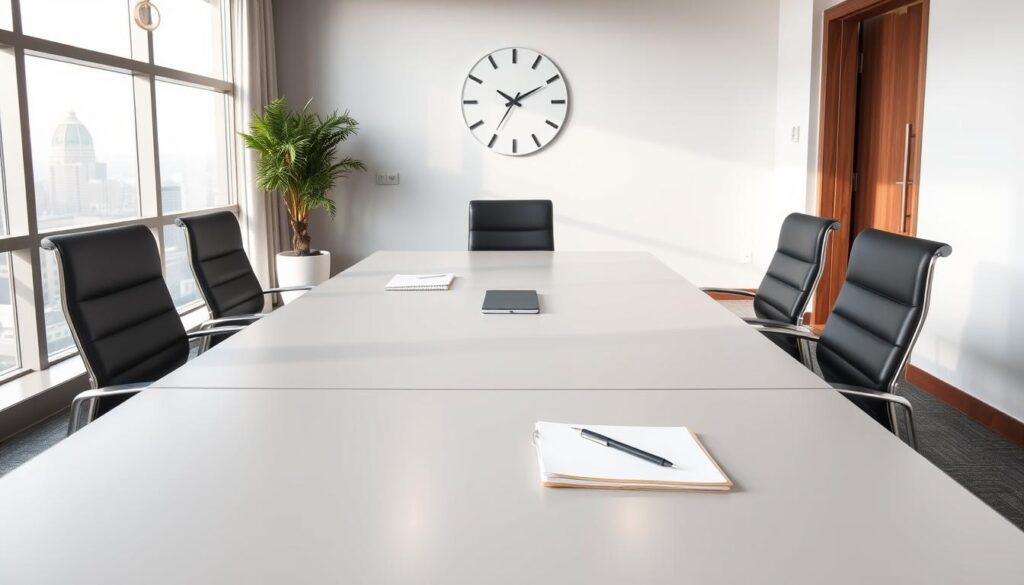The job interview is key for recruiters to find the best candidate. It lets them check if a candidate has the right skills and personality. But, companies need to make their interview process better to really see what candidates can do. This article will give you tips and strategies to do well at every step of the interview.
Key Takeaways
- The job interview process is crucial for employers to evaluate candidates’ skills and fit for the role.
- Candidates must prepare thoroughly to excel in each stage of the interview process.
- Understanding common interview questions and strategies can help job seekers perform better.
- Mastering the interview process can significantly improve one’s chances of landing the desired job.
- Practicing and refining one’s interview skills can make a significant difference in the outcome.
What is the Interview Process?
The interview process is key in hiring, a series of talks between a company and a candidate. It checks if the candidate fits the job, has the right skills, and will get along with the team. This helps the company choose the best person for the job.
Also Read : Apply Now: Simple Application Form Process
Definition and Purpose
The main goal of the interview process is to see if a candidate’s skills match the job and if they’ll fit in with the company’s culture. Interviews are crucial in the hiring process. They let employers see if the job meets the candidate’s goals and needs.
Also Read : Streamlining Your Recruitment Process: Key Steps
The interview process has two main goals:
- To check the candidate’s skills, problem-solving, and experience.
- To see if the candidate fits the company’s culture and work environment.
This way, employers can pick candidates who not only have the right skills but also fit in well with the team.
Also Read : Exploring Civil Service: Careers In Government
| Key Aspects of the Interview Process | Description |
|---|---|
| Evaluation of Qualifications | Assess the candidate’s technical skills, expertise, and relevant experience to determine their suitability for the role. |
| Assessment of Cultural Fit | Evaluate the candidate’s alignment with the company’s values, work environment, and team dynamics. |
| Hiring Decision | Utilize the insights gained during the interview process to make an informed decision on the most suitable candidate for the position. |
Knowing what the interview process is about helps job seekers prepare better. It increases their chances of doing well in the hiring process.
Also Read : Government Jobs: Required Qualifications And Skills
Stages of the Interview Process
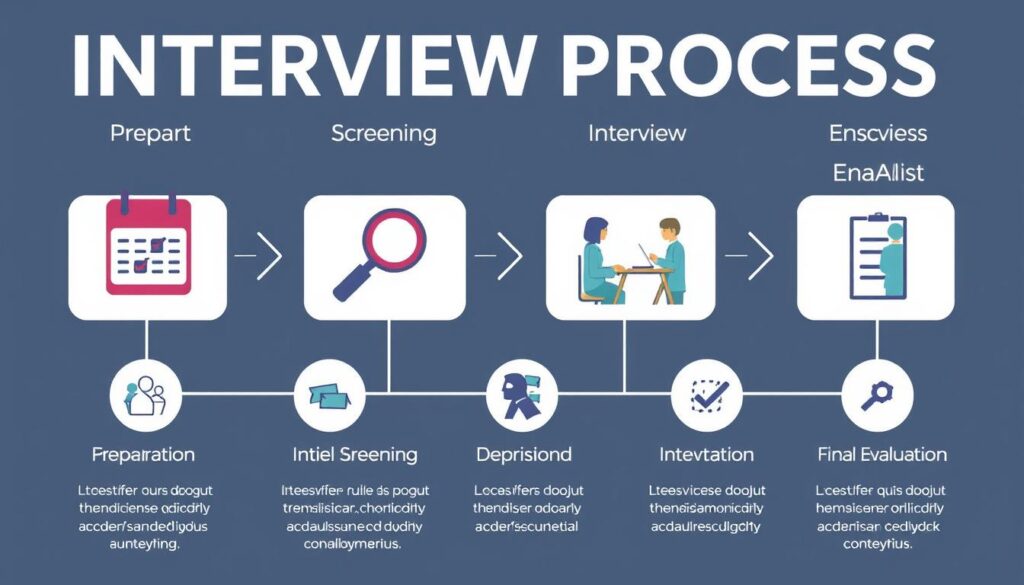
The job interview process has several stages to check if a candidate fits the job and the company’s culture. These steps change based on the company, industry, and job type. But, most interviews follow these main stages:
Also Read : Crypto Currency: A Beginner’s Guide To Digital Money
- Screening Interview: This first step is a phone or video call. It helps the recruiter see if the candidate meets the job’s basic needs.
- Skills Assessment: Candidates might do tests or exercises to show their skills and how they solve problems.
- First Interview: This is the first face-to-face or online chat. It goes deeper into the candidate’s background, skills, and why they want the job and like the company.
- Second Interview: A second chat, with more people, helps the company see if the candidate fits well with the company’s values and culture.
- Third Interview (if applicable): For some jobs, a third interview happens. It could be with a panel or top executives to decide who to hire.
The company’s recruitment team decides how many stages and what order they are in. They make sure each candidate is fully checked for the job and if they’re a good fit.
| Stage | Purpose | Typical Format |
|---|---|---|
| Screening Interview | Assess basic qualifications and fit | Phone or video call |
| Skills Assessment | Evaluate practical abilities and problem-solving skills | Skills-based tests or exercises |
| First Interview | Deeper dive into candidate’s background and fit | In-person or virtual interview |
| Second Interview | Further evaluate candidate’s fit and alignment with company culture | In-person or virtual interview with additional stakeholders |
| Third Interview (if applicable) | Final hiring decision | In-person or virtual panel or executive-level discussion |
Knowing about the stages of the interview process, steps of the interview process, and interview process steps helps candidates get ready and do well in the typical interview process.
Preparing for the Interview Process
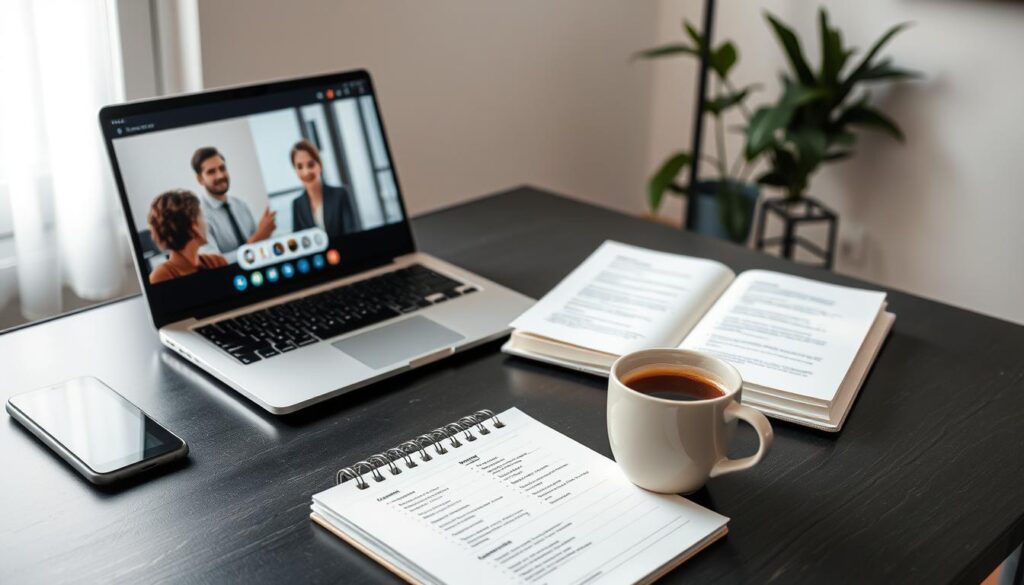
To do well in interviews, it’s key to prepare for the interview well. This means doing a lot of research for the interview and practice for the interview. Getting ready this way can really help you stand out and get the job you want.
Research and Practice
It’s important to learn about the company’s mission, values, and latest news. This shows you’re really interested and understand the company. Doing this research for the interview also helps you answer questions better, fitting your answers to the job and the company’s needs.
Also, practicing for the interview by rehearsing answers to questions like “Tell me about yourself” and “Why do you want this job?” can make you feel more confident. It also helps you give clear, well-thought-out answers. Working on your body language, how you speak, and listening skills can also make a good impression during the interview process.
- Thoroughly research the company’s mission, values, and recent news
- Practice responses to common interview questions
- Refine your body language, tone of voice, and active listening skills
Spending time to prepare for the interview can really up your chances of doing well in the interview process. This can help you land the job you want.
“The more you prepare, the more confident and composed you’ll be during the interview.”
Common Interview Questions and Strategies
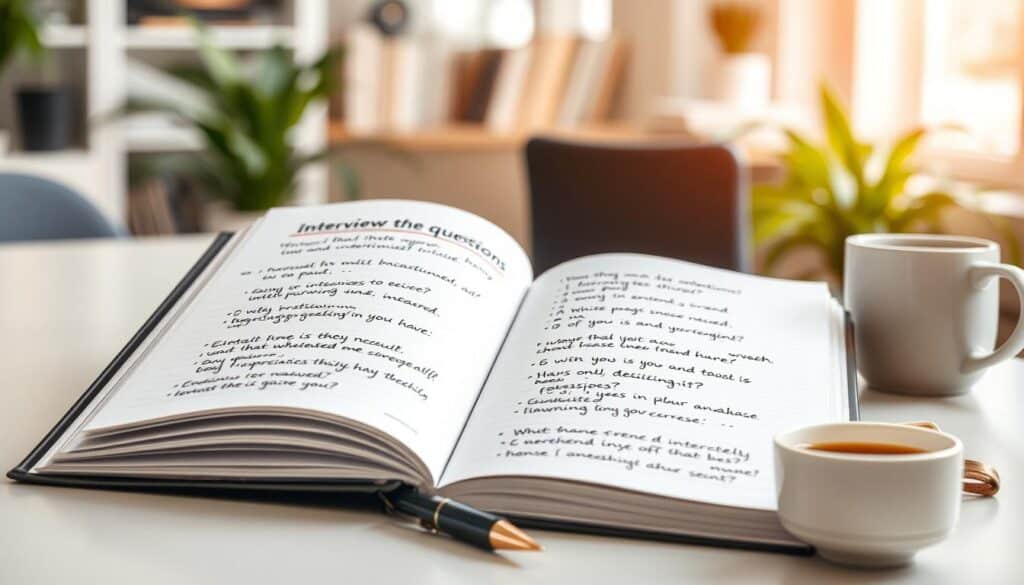
The interview is a key step in getting a job. Candidates will face questions that test their skills, experience, and how they solve problems. Knowing how to prepare can greatly improve your chances of doing well in the interview.
Behavioral interview questions look at how you handled certain situations before. They often start with “Tell me about a time when…” or “Describe a situation where…” To answer, share real-life examples that show off your skills and experience.
Situational interview questions give you hypothetical scenarios to solve. They start with “What would you do if…” or “How would you handle a situation where…” Explain how you would tackle the problem step by step, showing off your critical thinking.
Employers may also ask skills-based questions to see if you have the right technical skills for the job. These could be case studies, problem-solving exercises, or questions about industry knowledge or software.
Knowing the common interview questions helps candidates prepare answers that show they’re a good fit for the job. Practicing with interview questions to ask and types of interview questions builds confidence and ensures a successful interview.
“The key to answering behavioral interview questions is to provide specific, detailed examples that demonstrate your skills and experience.”
By getting ready for situational interview questions and how to answer interview questions, candidates can go into the interview feeling confident. This can really help them get the job they want.
The Interview Process
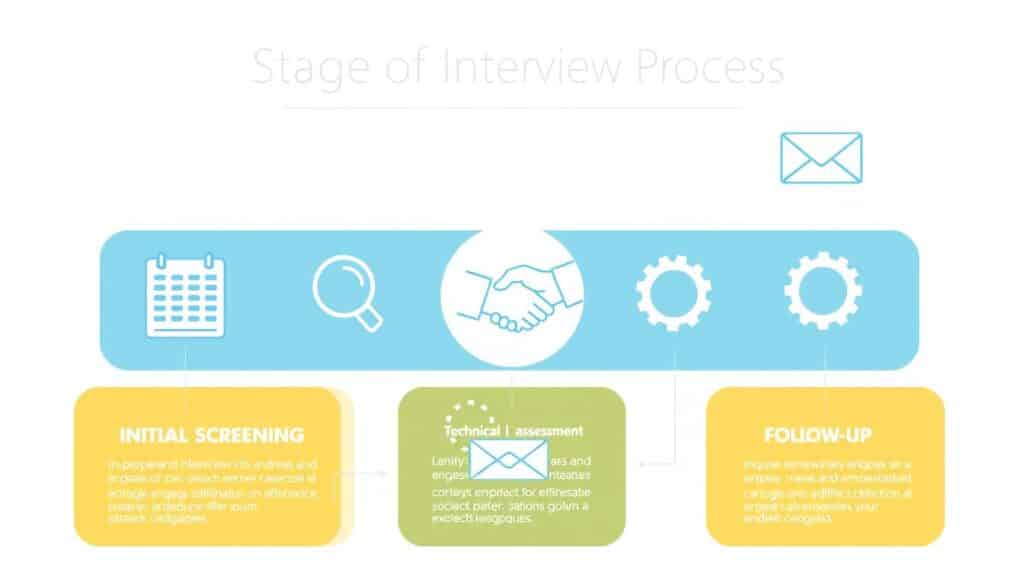
The interview process is key in finding the right person for a job. It starts with a first screening, often over the phone or via video call. Then, there may be in-person meetings, skills tests, and final checks.
Candidates should be ready to answer different types of questions. These include questions about past experiences, how they handle certain situations, and their skills. Employers use these questions to see if a candidate is a good fit for the job and the company culture.
- Initial Screening: This first step is usually a phone or video call. Employers want to know about the candidate’s background, experience, and if they’re a good match for the job.
- In-Person Interviews: If the first step goes well, candidates get invited for in-person meetings. These let employers get to know the candidate’s skills, personality, and how they’ll fit in with the team.
- Skills Assessments: Some jobs require candidates to do specific tests, like coding challenges or writing tasks. These help employers check the candidate’s technical skills.
- Final Evaluation: The last part of the process might include more interviews, checking references, and a detailed look at the candidate’s qualifications for the job.
| Stage | Purpose | Typical Activities |
|---|---|---|
| Initial Screening | Assess basic qualifications and fit | Phone or video interview, review of application materials |
| In-Person Interviews | Evaluate skills, personality, and cultural fit | One-on-one interviews, panel interviews, group discussions |
| Skills Assessments | Demonstrate technical abilities | Coding challenges, writing exercises, presentations |
| Final Evaluation | Comprehensive assessment of the candidate | Additional interviews, reference checks, final decision |
Knowing the steps in the interview process and preparing well can help candidates stand out. This can boost their chances of getting the job they want.
“The key to success in the interview process is to approach it with confidence, preparation, and a genuine enthusiasm for the role and the company.”
Also Read : How Can You Improve Job Security?
Conclusion
The job interview is a key part of finding the right candidate. It lets employers see who is best for the job. Job seekers can get ready better by knowing the interview stages, like initial screening and skills tests.
Doing research, practicing often, and knowing common interview questions are key. This helps job seekers do well in interviews.
The summary of the interview process shows how important it is. Job seekers need to show they’re the right fit and the best choice. This way, they can make a good impression and get their dream job.
The importance of the interview process is huge. It helps employers make smart choices that help both the company and the new hire.
By using the tips from this article, job seekers can feel confident in interviews. With good preparation and the right attitude, the interview can be a chance to show off skills and find the perfect job.
FAQs
Q: What are the main steps of the interview process?
A: The main steps of the interview process typically include initial screening, phone interview, in-person interviews, and a final interview. Each stage aims to assess the job candidate’s skills and fit for the position.
Q: What type of interview should I expect during the interview process?
A: You may encounter various types of interviews, including structured interviews, behavioral interviews, and situational interviews. Each type uses different methods to evaluate the candidate’s abilities and fit for the role.
Q: What questions should I ask the interviewer during the job interview?
A: It’s important to prepare questions to ask the interviewer such as inquiries about the company culture, growth opportunities, and the team dynamics. This will demonstrate your interest and help you assess if it’s a good fit for you.
Q: How can I improve my interview process as a hiring manager?
A: To improve your interview process, ensure you have a clear job description, utilize a structured interview format, and prepare a set of standardized questions. This will help you evaluate interview candidates more effectively.
Q: What is a structured interview and how does it benefit the interview process?
A: A structured interview is a systematic approach where the interviewer asks a set of standardized questions to all candidates. This method enhances the effectiveness of the interview process by minimizing bias and allowing for better comparison of candidates.
Q: What are some common interview questions to ask candidates?
A: Common interview questions to ask candidates include inquiries about their previous experience, how they handle challenges, and examples of teamwork. These questions help assess their qualifications and cultural fit.
Q: What should I do at the end of the interview?
A: At the end of the interview, thank the interviewer for their time, express your continued interest in the position, and inquire about the next steps in the interview process. This shows professionalism and eagerness.
Q: How can I prepare for a final interview with the hiring manager?
A: To prepare for a final interview with the hiring manager, review the job description, practice answers to common interview questions, and prepare thoughtful questions to ask. Researching the company and its goals can also help you align your responses with their needs.
Q: What is the role of the interviewer during the interview stages?
A: The role of the interviewer during the interview stages is to evaluate the job candidate’s qualifications, assess their fit for the position, and gather insights through effective questioning. They guide the conversation and facilitate the interview process.
Q: What are situational questions and how are they used in interviews?
A: Situational questions are designed to assess how a job candidate might handle hypothetical scenarios related to the job. These questions help interviewers gauge the candidate’s problem-solving skills and decision-making abilities during the interview process.


